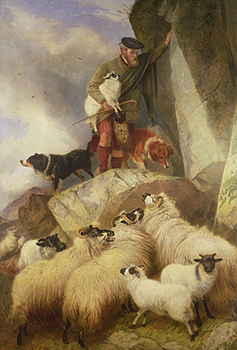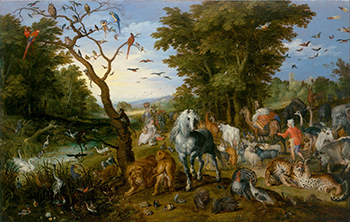From Our Archive
Debie Thomas, "A Shepherd Who is Good" (2021) and "Just Wondering" (2015).
For Sunday April 21, 2024
Lectionary Readings (Revised Common Lectionary, Year B)
1 John 3:16-24
John 10:11-18
Psalm 23
This Week's Essay
THANK YOU to Michael Fitzpatrick for a six-week series of lectionary essays from Easter to Pentecost. Michael was a regular staff writer for JWJ from 2020 to 2023. He is a U. S. Army veteran and philosopher. He served five years in the Army as a Chaplain's Assistant, which included two deployments to Iraq during 2004-05 and 2006-08. Michael is finishing his PhD at Stanford University.
In the classic comic strip Calvin & Hobbes, Calvin discovers his activist side when he and his stuffed tiger Hobbes stumble upon a clear-cut in the forest. Calvin exclaims in surprise, “Hey! What happened to the trees here? Who cleared out the woods? There used to be lots of animals in these woods! Now it’s a mud pit!”
Hobbes, anthropomorphically coming to life, notices a nearby sign that reads, “Future site of Shady Acres condominiums.” Upon hearing Hobbes read this aloud, Calvin exclaims in exasperation, “Animals can’t afford condos!”
Filled with righteous indignation, Calvin wants to act. “Where are all the animals supposed to live now that they cut down those woods to put in houses??” he asks sincerely. He then lands upon a rather clever rhetorical question, “By golly, how would people like it if animals bulldozed a suburb and put in new trees?!?” (emphasis in original)
In the next frame of the comic, Calvin and Hobbes both stare for a moment as the possibilities latent in Calvin’s sharp quip become apparent. In the final frame, we see Calvin and Hobbes in full activist mode, as they search for keys to the nearby bulldozer so that they can head to town to raze some houses and plant trees.
 |
|
Earth Day.
|
It’s a funny if tragic bit of wit, capturing both the urgency that we must do something in the face of overwhelming injustice, and the futility of our frantic flailing that can often feel like mere drops of water in an arid dust bowl. This particular Calvin & Hobbes comic is rather pertinent for the 4th Sunday in Easter 2024, which comes a day before Earth Day, a global observance to draw attention to environmental destruction and the need for robust protection and accountability for the non-human aspects of our island home.
Calvin’s process of thought in the comic, from his discovery of environmental degradation to his apoplexy over the harm done to animals to his decision to act—do something—evokes a question: what does it mean to commit one’s self to a just cause? Calvin recognizes that caring about justice cannot simply involve having feelings or expressing condemnation. It must also involve action, often requiring immense transformation of our presence in the world. We won’t be good stewards of our planet without drastically rethinking our basic practices towards property rights, resource mining, energy consumption, and human reproduction.
Our epistle reading for this Sunday in 1 John is also about what it means to commit ourselves to a just cause—the ultimate just cause, that of following Jesus as our Lord and Savior. The transformation demanded is no less great and our beliefs matter. What Calvin believed about the destruction of the forest directed his action; likewise our belief in Jesus leads us to live a new kind of life.
In 1 John 3.11, we are given the climax or pinnacle of the letter, the new commandment of Christ followers, that “we should love one another.” Earlier, John has described this command as “not a new command but an old one” (2.7), being part of the message of God heard from the beginning of the apostle’s preaching and foreshadowed in the Jewish scriptures and storytelling. Yet he paradoxically goes on to call it “a new command,” because “its truth is seen in him [Christ] and you, because the darkness is passing and the true light is already shining” (v. 8). It’s new because this light is shining in a way it hadn’t before Jesus.
Loving one another certainly sounds like a just cause. Isn’t John simply telling us to be more thoughtful, more compassionate, more tolerant, and that it doesn’t matter so much what we believe? That’s hard to square with John’s insistence that loving one another commits us to some critical pieces of knowledge.
One piece of knowledge is that loving each other is how “we know that we have passed from death to life” (3.13). “Anyone who does not love remains in death,” John warns, revealing that this new command, which is also very old, is totally and utterly transformative. It liberates us from the kind of life that can only be called a remaining-in-death into the true life, eternal life; that is, a life which is deeply rooted in the permanence of God. Such a life is not just a doing, a loving, but a being, a being in love, and a knowing, a knowing that we have been liberated from death to life.
 |
|
The Rescue, oil on canvas by Richard Ansdell, 1866.
|
Another critical piece of knowledge is how we know what love is. John will not abide any of our contemporary nonsense that we all innately know the meaning of love, or that love is whatever feels right in our hearts. No, he insists that we believe the ultimate truth of love because we have witnessed true love in Jesus. “This is how we know what love is,” John writes. “Jesus Christ laid down his life for us” (3.16).
If we are the kind of people who “belong to the truth” and who “set our hearts at rest in the divine presence,” then we have “confidence before God” because “we keep his commands and do what pleases him” (vv.19-22). We commit ourselves to this just cause by obeying what God commands of us, which is both a believing and a doing: “And this is God’s command: to believe in the name of his Son, Jesus Christ, and to love one another” (v. 23). The act follows from the belief, because it is only by accepting that Jesus has laid down his life for us that we realize “we ought to lay down our lives for our sisters and brothers” (v. 16, emphasis added). We’ve no obligation to lay down our lives if we are not fully believers in Christ laying down his life. John says definitively, “Whoever claims to live in God must live as Jesus did” (2.6). To do that, we must know how Jesus lived!
We get one such glimpse in our Gospel reading from John 10.11-18, in which Jesus presents himself to his disciples as “the good shepherd who lays down his life for the sheep.” Pay close attention to the empowerment of obeying commands. Committing one’s self to a just cause is not simply a matter of deciding what we believe in and doing it, as if our lives have no reference to something outside of ourselves which is making a claim on us. Bishop John A. T. Robinson, in his book Exploration into God, says that
integral to any God-statement, at any rate in the Judeo-Christian tradition, is the consciousness of being encountered, seized, held by a prevenient reality, undeniable in its objectivity, which seeks one out in grace and demand and under the constraint of which a [person] finds [themselves] judged and accepted for what [they] truly [are]. (p. 66)
To be related to God is to know ourselves as no longer belonging to ourselves, as being bound to the life and guidance of a love that comes from without. Yet this obedience is true freedom and true life. Notice how Jesus, the very Son, describes his relationship to his Father. His power to take up his life and lay it down comes as “a command from my Father.” Yet by this command he acts under his own power, out of his own freedom. If he lays down his life, it isn’t because anyone forces him to do so. “I lay my life down of my own accord,” Jesus testifies.
 |
|
The Entry of the Animals into Noah's Ark, by Jan Brueghel the Elder, 1613.
|
Returning to 1 John, we see that just as Jesus did what his Father commanded, so “the one who keeps God’s commands lives in God” (3.24). Following Jesus and laying down our lives in love as he did is an act of free response to God’s love.
But now comes the difficult part. Loving one another is not just a command about how we are to treat others, but also a command about how we are not to treat others. “Anyone who claims to be in the light but hates a sister or brother is still in the darkness,” John writes (2.9). We have not passed from life to death if we still hate others.
John goes further, writing that “anyone who hates a sister or brother is a murderer, and you know that no murderer has eternal life residing in them” (3.15). John illustrates this by saying that we cannot be like Cain, “who belonged to the evil one and murdered his brother” (v. 12). And if it sounds extreme to equate hate with murder, let us remember that Jesus taught the very same thing in the Sermon on the Mount (cf. Matt. 5.21-22).
Finally, John says, “If anyone has material possessions and sees a brother or sister in need but has no pity on them, how can the love of God be in that person? Dear children, let us not love with words or speech but with actions and in truth” (3.17-18). Our belief in the just cause of God’s love will result in lives of both action and truth, or the love of God is not in us.
Obviously John is here thinking of our human neighbors and siblings. But as we reflect on Earth Day, perhaps it would be most faithful to the just cause of Christ to expand John’s teaching outward, to the fauna and the flora, to the water cycle and the mineral deposits. When young Calvin stumbled upon that clear-cut in the forest and imagined some housing development filling the void, he saw our animal neighbors left homeless and he had pity on them. Calvin sought to love them, with humorous naivety, in action and in truth.
As Christ makes us into people who live in the light and not in darkness, people who know and not just feel what love is, people who lay down our lives for others, we must ask ourselves: would the creatures we share this earth with describe our actions as those of love or hate? Would they describe our lives as reflections of eternal life or death? Would they describe us as people who lay down our lives for all creatures great and small?
“We know that we have passed from death to life, because we love each other. Anyone who does not love remains in death.”
Weekly Prayer
Christina Rossetti (1830–1894)
I have no wit, no words, no tears;
My heart within me like a stone
Is numb’d too much for hopes or fears;
Look right, look left, I dwell alone;
I lift mine eyes, but dimm’d with grief
No everlasting hills I see;
My life is in the falling leaf:
O Jesus, quicken me.My life is like a faded leaf,
My harvest dwindled to a husk:
Truly my life is void and brief
And tedious in the barren dusk;
My life is like a frozen thing,
No bud nor greenness can I see:
Yet rise it shall–the sap of Spring;
O Jesus, rise in me.My life is like a broken bowl,
A broken bowl that cannot hold
One drop of water for my soul
Or cordial in the searching cold;
Cast in the fire the perish’d thing;
Melt and remould it, till it be
A royal cup for Him, my King:
O Jesus, drink of me.
Michael Fitzpatrick cherishes comments and questions via m.c.fitzpatrick@outlook.com
Image credits: (1) Painting Valley; (2) Fine Art America; and (3) S.D. Cason Catholic Gallery.





